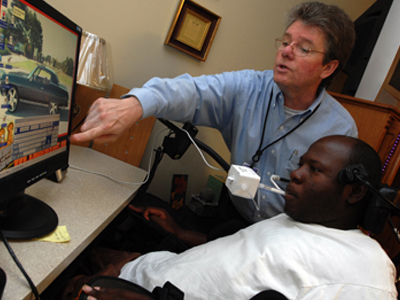George Haden wants to finish the autobiography he was writing before surgery complications took away his ability to type.
Caroline Duckworth wants to stay in better touch with her three children, who haven’t lived with their mom since Duckworth became paralyzed from the neck down.
And quadriplegic Tony Watts longs for an easier way to e-mail friends and surf the Internet.
All three residents of Methodist Specialty Care Center in Flowood expect to benefit from a new Adaptive Computing Lab at Methodist Rehabilitation Center in Jackson.
Funded by a $20,775 Excelerator Grant from AT&T, the lab provides a hands-on introduction to innovations designed especially for disabled computer users.
“Our AT&T vision is to connect people with their world, everywhere they live and work,” said AT&T State President Mayo Flynt. “This project will make it easier for people with disabilities to achieve that goal.”
Dr. Dobrivoje Stokic, administrative director of research at Methodist Rehab, said the center is grateful for AT&T’s support. “Computer technology can truly expand the capabilities of people with severe disabilities,” he said. “The lab will help us pair people with the right resources to attain their goals.”
George Gober, assistive technology associate for Methodist Rehab, said lab visitors will be able to try out a variety of user-friendly alternative devices and programs, including onscreen keyboards, voice-recognition software and special trackballs or joysticks,.
“We also can make adaptive changes in the Windows operating environment to provide easier physical access,” Gober said. “We can enlarge fonts, provide visual or audio cues and adjust the mouse speed. There are over 50 of these adaptive accommodations that can be matched to the needs of the user.”
Lab staff also will help participants improve their general computer skills. “We’ll teach them to master shortcuts to cut down on keystrokes, to use specific programs like e-mail and to understand any special adaptive software that they might use,” Gober said. “Plus, we’ll be able to address ergonomic concerns, such as the proper desk height or keyboard position for their particular abilities.”
Methodist Specialty Care Center is a division of Methodist Rehab. Therefore, residents like Haden, Duckworth and Watts are able to take advantage of the computer lab’s technology. And they’ve learned that adaptive controls that operate wheelchairs can be utilized for computers, too.
For instance, Watts now sucks or blows on a straw to drive his wheelchair and to navigate his computer screen – a system known as sip-and-puff.
Duckworth also uses a sip-and-puff mouse, while Haden will operate his computer as he does his wheelchair – via a small rubber cup attached to a long joystick. Haden will direct the movement of his computer cursor by thrusting his chin in the cup. To “click” on an item, he’ll press his cheek against a special switch.
By using an onscreen keyboard, Haden, 55, should be able to return to writing the memoir he began at 40. “I want to write letters to my family, too,” he said.
Duckworth, 37, also is looking forward to communicating more with friends and family. “I want to e-mail my daughter,” she said. “And I’ve thought about taking some classes online.”
As for Watts – age 26 – he’s already adept at sipping and puffing his way through Yahoo pages. But he’s hoping Gober can help him devise some strategies to increase his typing speed. “If I had to type a letter for tomorrow, I should have started last week,” he jokes.
The Adaptive Computing Lab is currently open to residents of Methodist Specialty Care Center in Flowood and patients of Methodist Rehabilitation Center in Jackson and its outpatient clinics. For more information, call 601-364-3522.

